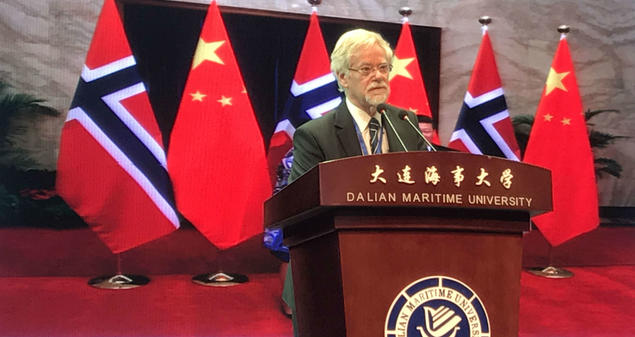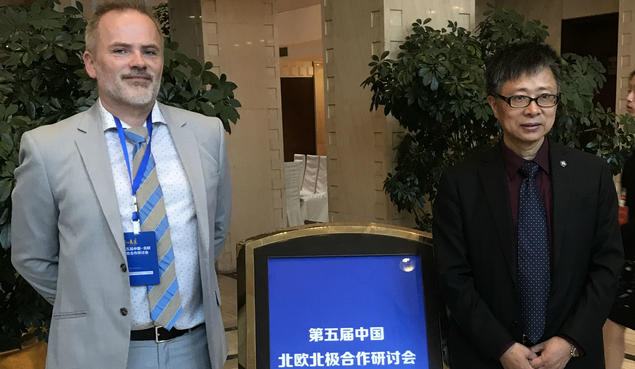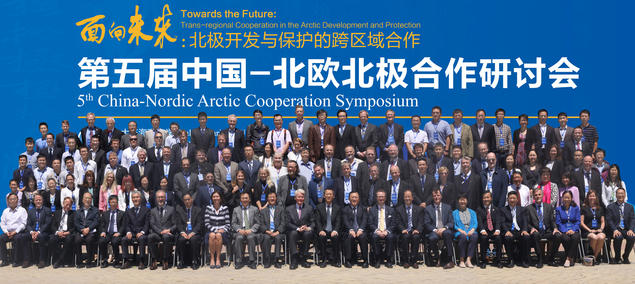Bridging the gap: China and Norway find common ground in the Arctic

While diplomatic and political relations between Norway and China have been strained recent years, research cooperation seems to be thriving. A high-level meeting this week highlighted mutual Arctic interests between China and the Nordic states.
The conference was arranged by the China-Nordic Arctic Research Center (CNARC), an international consortium initiated by FNI and the Polar Research Institute of China (PRIC), in collaboration with other research institutes, to promote China-Nordic cooperation on Arctic research. It gathers once a year for a symposium and a roundtable discussion. This year’s symposium, Towards the Future: Trans-regional Cooperation in the Arctic Development and Protection, took place 24-26 May in the port city of Dalian, in northeast China, not far from the North-Korean border.
China’s ambitions in the Arctic
 Leading Arctic scientists from both China and the Nordic countries attended, as did several high-level politicians and ambassadors, including Norway’s Polar Ambassador Anniken Ramberg Krutnes, and the former President of Iceland, Olafur Ragnar Grimsson, who currently chairs the Arctic Circle.
Leading Arctic scientists from both China and the Nordic countries attended, as did several high-level politicians and ambassadors, including Norway’s Polar Ambassador Anniken Ramberg Krutnes, and the former President of Iceland, Olafur Ragnar Grimsson, who currently chairs the Arctic Circle.
Panel discussions at the symposium ranged from issues like Arctic shipping, maritime risks and security issues, to the Belt and Road Initiative, Arctic fisheries management and the global geopolitics of the High North.
Changing energy landscape
 From FNI, Associate Fellow Arne Walther, former First Secretary General of the International Energy Agency, gave a keynote speech titled 'The Arctic in a Changing Global Energy Landscape.' Senior Research Fellow Gørild M. Heggelund, which has lived and worked in China for several years, gave a presentation on 'China's climate policy: does and Arctic dimension exist?' (See also her recent research article on this subject.) Research Fellow Iselin Stensdal gave a presentation on 'Chinese involvement in the Isua iron-ore mine project on Greenland: making a mountain of a molehill?'
From FNI, Associate Fellow Arne Walther, former First Secretary General of the International Energy Agency, gave a keynote speech titled 'The Arctic in a Changing Global Energy Landscape.' Senior Research Fellow Gørild M. Heggelund, which has lived and worked in China for several years, gave a presentation on 'China's climate policy: does and Arctic dimension exist?' (See also her recent research article on this subject.) Research Fellow Iselin Stensdal gave a presentation on 'Chinese involvement in the Isua iron-ore mine project on Greenland: making a mountain of a molehill?'
 The latter two presentations are based on the AsiArctic programme, a research project led by the FNI with several international partners, including the Institute for Defense Studies and Analyses (IDSA) in India, the Korea Maritime Institute (KMI), the National Institute for Defense Studies (NIDS) in Japan, and the Shanghai Institutes for International Studies (SIIS).
The latter two presentations are based on the AsiArctic programme, a research project led by the FNI with several international partners, including the Institute for Defense Studies and Analyses (IDSA) in India, the Korea Maritime Institute (KMI), the National Institute for Defense Studies (NIDS) in Japan, and the Shanghai Institutes for International Studies (SIIS).
Towards closer ties
Political and economic relations between China and Norway have suffered in recent years, due to freeze in diplomatic relations after the Chinese dissident Liu Xiaobo was awarded the Nobel Peace Prize in 2010. However, relations finally seem on the verge of normalizing. Just before Christmas last year, a 'reconciliation statement’ between the two governments was signed, and in April the Norwegian Prime Minister and Foreign Minister made their first official visit to China in more than six years.
That being said, in research and scientific cooperation, relations have remained largely uncompromised – and forums such as the CNARC, established back in 2013, have certainly helped. FNI Director Geir Hønneland sits in the CNARC Executive Committee, representing one of its two Norwegian founding members (FNI and the Norwegian Polar Institute), and is pleased to be a part of what he sees as a mutually fruitful cooperation:
FNI began developing its expertise on Chinese environmental and climate politics more than two decades ago, long before China became the hot topic it is today', Hønneland explains. ‘In the last few years, this expertise has expanded into Chinese Arctic politics, and we are a central member of the CNARC network. Cooperation with our Chinese partners has been running smoothly, and we regularly receive visiting scholars from Chinese institutions - a good arrangement for both sides.’

It was decided by the CNARC Executive Committee on Wednesday that next year’s symposium is to be held in Tromsø, organized jointly by FNI and the Norwegian Polar Institute.

